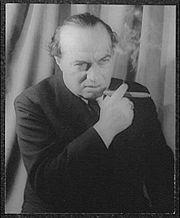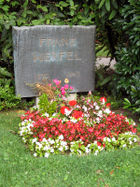Franz Werfel


Franz Werfel (September 10, 1890 – August 26, 1945) was an Austrian-Bohemian novelist, playwright, and poet.
Contents |
Biography
Born in Prague (then part of the Austro–Hungarian Empire), Werfel was the first of three children of a wealthy manufacturer of gloves and leather goods. His mother, Albine Kussi, was the daughter of a mill owner. His two sisters were Hanna (born 1896) and Marianne Amalie (born 1899).[1] He was a contemporary and colleague of Franz Kafka, Max Brod, Martin Buber, and other Jewish intellectuals who flourished in the first decades of the 20th century.[2] He served in the Austro–Hungarian Army on the Russian front and in the press office in Vienna, where he met and fell in love with Alma Mahler.[2]
In 1920 Alma, widow of Gustav Mahler, divorced architect Walter Gropius in order to be with Werfel by whom she had had a son, Martin, who was born prematurely, and who soon died; they finally married in 1929.[2] Werfel was already an established author, having assumed a leading place in German letters as an expressionist playwright. A journey in 1929 to the Middle East and encountering starving refugees inspired his novel The Forty Days of Musa Dagh which drew world attention to the Armenian Genocide at the hands of the Turks.[2]
An identified[discuss] Jew, Werfel left Austria after the Anschluss in 1938 and went to France. After the German invasion and occupation of France during World War II, and the deportation of French Jews to the Nazi concentration camps, Werfel had to flee again.[2] With the assistance of Varian Fry and the Emergency Rescue Committee in Marseille, he and his wife narrowly escaped the Nazi regime and traveled to the United States.[2]
While in France, Werfel made a visit to the shrine of the Our Lady of Lourdes at Lourdes, where he found spiritual solace. He also received much help and kindness from the Catholic orders that staffed the shrine.[2] He vowed to write about the experience and, safe in America, he published The Song of Bernadette in 1941.

In southern California, Werfel wrote his final play, Jacobowsky and the Colonel (Jacobowsky und der Oberst) which was made into the 1958 film Me and the Colonel starring Danny Kaye; Giselher Klebe's opera Jacobowsky und der Oberst (1965) is also based on this play. Before his death, he completed the first draft of his last novel Star of the Unborn (Stern der Ungeborenen), which was published posthumously in 1946.[2]
Franz Werfel died in Los Angeles in 1945 and was interred there in the Rosedale Cemetery. However, his body was returned in 1975 to Vienna for reburial in the Zentralfriedhof.[3]
Bibliography
In English (some of these titles are out of print):
- Verdi. Novel of the Opera (1924), novel
- Juarez and Maximilian (1925), play
- The Man Who Conquered Death (Der Tod des Kleinbürgers) (1928), short story
- Class Reunion (Der Abituriententag) (1928), novel
- The Forty Days of Musa Dagh (1933), novel
- Listen to the Voice, also as Jeremiah (Höret die Stimme, or Jeremias) (1937), novel
- Embezzled Heaven (Der veuntreute Himmel) (1939), novel
- The Song of Bernadette (1941), novel
- A Pale-blue Woman's Handwriting (Eine blass-blaue Frauenschrift) (1941), novella
- Jacobowsky und der Oberst (1944), play
- Star of the Unborn (1945/46), science-fiction novel
References
- ↑ Hans Wagener. Understanding Franz Werfel (University of South Carolina Press, 1993) ISBN 0872498832
- ↑ 2.0 2.1 2.2 2.3 2.4 2.5 2.6 2.7 "Franz Werfel". Books and Authors. http://www.kirjasto.sci.fi/fwerfel.htm. Retrieved 5 December 2007.
- ↑ Franz Werfel – timeline and works (German)
See also
- Exilliteratur
External links
- A small album of miscellaneous photographs
- Franz Werfel author profile
- Jeremiah - Symphony No. 3 (1997) by Bertold Hummel after the novel Jeremias by Franz Werfel]